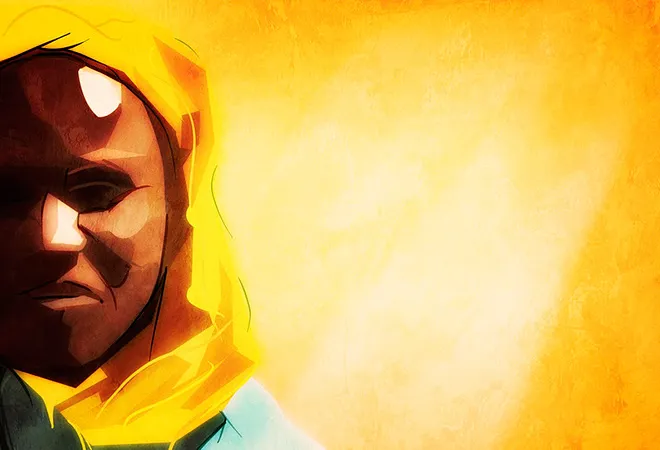-
CENTRES
Progammes & Centres
Location
The change of power will hardly alter the fate of the displaced; more neglect and violence is currently being dreaded.

Image Source: Surian Soosay — Flickr/CC BY 2.0
The existing atmosphere within Myanmar throws a shadow of complete ambiguity. And hope is bleak for the upcoming future. Though many spectators believe the democratic government hardly exercised any of its egalitarian power, the Rohingya issue has been looming large in the background. The sudden seizure of power by the military government has thrown the fate of the Rohingyas, not only in the Rakhine state but in neighbouring Bangladesh, in question.
Many, even the Rohingyas themselves, had hoped for this issue to cease with the heralding of a new democratic government in Myanmar. However, on the contrary, after the National League for Democracy (NLD) government came to power in 2016, after decades of military and quasi military rule, the problem has more or less remained the same or rather has escalated. There are quite a few reasons for this. There has also been no policy to integrate the Rohingyas into Myanmar society in a way that does not upset the majority-Buddhist nationalists. Like the nationalists, the government also seems to view the Rohingyas as ‘outsiders’ to their country. In addition, the attempt of NLD to be hand-in-glove with the army has been quite evident throughout its rule.
In any case, the last major clampdown by the ‘Tatmadaw’ (the Myanmar army) on the Rohingya population in 2017 led to a massive exodus of more than 700,000 Rohingyas to Bangladesh; this movement caused a sharp increase in the Rohingya population of Bangladesh to around 866,457. This has caused worry and discord between the two nations since the repatriation efforts have seemed half-hearted and ineffective till now.
Recently, in a virtual dialogue, both Myanmar and Bangladesh in mediation with China agreed to begin the repatriation process later this year. The Myanmar democratic government named only a little more than 300 Hindus they are willing to take back in the camp areas. The question of the rest of the majority was not discussed. The current military coup throws the existing dynamics in chaos.
While the Rohingyas themselves have condemned the act, they tend to fear for their lives. Today, an estimated 600,000 Rohingya remain in Rakhine State, of whom around 126,000 are internally displaced and effectively confined to camps established in the central part of the State following sectarian violence in 2012. They live in a pitiable state under the glare of the military with little access to healthcare even during the ongoing pandemic.
There are only two government-run health centres with few beds, both inaccessible to those in remote camps. They are often headed by poorly-trained medical staff who perform only basic treatments. For those facing serious medical problems, obtaining an emergency transfer to Sittwe General Hospital is difficult due to restrictions on movement and financial constraints. Only 16 percent of Rohingya in the camps reported receiving necessary medical care. Although authorities say that the displaced Rohingyas are getting tested, the actual figures of testing have not been disclosed. Another matter of apprehension has been the current reports of the possibility of positive cases among few of the health and NGO workers serving within the camp areas.
In addition, there is widespread food insecurity within the camp areas. Since the displaced people are not supposed to work outside, they depend entirely on aid received from humanitarian organisations. The World Food Programme (WFP) is faced with the challenging predicament of logistics, weather and internal strife, among other challenges which are predominant in the region. This limits their ability to consistently provide food security to the displaced people.
Overcrowding restricts the scope of social distancing and self isolation. On top of this, communal water points and latrines, which are accessed by around 600 people, make it impossible for proper water, sanitation and hygiene (WASH) conditions to prevail.
Furthermore, the absence of internet connections since 2019 has further disrupted chances of swift communication as well as adequate response. Humanitarian organisations have tried to pursue the government, by sending letters, to lift the internet blockade due to the current emergency situation. However, no steps to do so have been taken so far. The change of power will hardly alter the fate of the displaced; more neglect and violence is currently being dreaded.
The Rohingyas in Bangladesh have stated they do not support the current act by the military, but they also do not worry about the fate of Aung San Su Kyi since she hardly did anything for their safety and security while they were living in Myanmar. The displaced people witnessed their houses burnt, their loved ones killed or abused and they themselves violated. Since the exodus, their villages have continued to be razed and currently satellite images show only a few camps being built in their place. Thus, they have no house or land to go back to.
Though with the democratic government they still felt there may be a chance to return; many are currently worried that with the military in power the repatriation process will not honour their wishes of citizenship, dignity and security.
The Bangladesh government, though shaken by the sudden transition, has stated that the change in power within Myanmar “doesn’t necessarily impede the repatriation process.” While the military government has agreed to start to repatriate the Rohingyas later this year and during earlier repatriations did accept the Rohingyas, however, the conditions and treatment they received after that have been a gross violation of the human rights mandate and has been condemned worldwide. The International Court of Justice ruling, which the democratic government had partially acknowledged, will not be entertained by the Tatmadaw and thus, also, puts the fate of Rohingyas living within Rakhine and Bangladesh in jeopardy.
The Rohingyas, even the ones in Bangladesh, are uniting with the current protest of the people within Myanmar by showing the three-finger salute, which has been popularised by the young of Myanmar as a sign of protest, in the hope that such efforts may shrink the discrimination they face as ‘outsiders.’ However, their future is still in limbo. It is imperative that the discriminatory policy against them undergoes a drastic change, and thus international pressure in this regard will remain crucial from all quarters. Whether democratic government comes back to power or not, the question of the Rohingyas needs to be raised time and again until a proper solution under a formal policy framework is drawn up. The current policy of Bangladesh of early repatriation will also need to undergo a change and a medium-term policy towards the Rohingyas must be worked out. Such actions may be required to uphold the dignity of the displaced people.
The views expressed above belong to the author(s). ORF research and analyses now available on Telegram! Click here to access our curated content — blogs, longforms and interviews.

Sreeparna Banerjee is an Associate Fellow in the Strategic Studies Programme. Her work focuses on the geopolitical and strategic affairs concerning two Southeast Asian countries, namely ...
Read More +